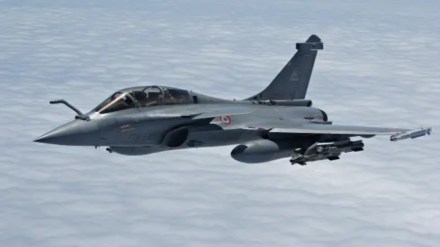India is on the verge of sealing a landmark defence deal with France, aimed at significantly boosting its naval capabilities.
During a press conference ahead of Navy Day, Indian Navy Chief Admiral Dinesh K Tripathi confirmed that the acquisition of 26 naval variant Rafale-M fighter jets and three additional Scorpene submarines is expected to be finalized soon. This deal, which will deepen the strategic defence partnership between India and France, will play a crucial role in enhancing India’s maritime strength amid growing security challenges in the Indo-Pacific region.
Strengthening India’s Naval Power
The procurement of the Rafale-M jets and the Scorpene submarines is part of India’s ongoing efforts to modernize and expand its naval forces. The Rafale-M jets, designed specifically for deployment on India’s indigenous aircraft carrier, INS Vikrant, will significantly improve the Indian Navy’s strike capabilities. These advanced fighter jets will be equipped with cutting-edge weaponry, including the Meteor beyond-visual-range air-to-air missiles, enhancing their effectiveness in maritime operations. The jets will also feature specialized anti-ship weaponry, designed to strengthen India’s deterrence and strike capabilities across the Indian Ocean.
As Admiral Tripathi pointed out, “We have redoubled efforts to include niche technologies into the force,” signalling the Navy’s continued commitment to adopting state-of-the-art systems. The acquisition of Rafale-Ms, expected to be finalized in the coming month, will provide India with a versatile and potent force capable of engaging multiple threats in a dynamic maritime environment.
In addition to the Rafale-M jets, the deal also includes the acquisition of three more Scorpene-class submarines, which will bolster India’s underwater deterrence capabilities. These submarines, currently under construction at Mazagon Dock Shipbuilders Limited (MDL) in Mumbai, are part of India’s broader strategy to develop a robust submarine fleet. The new submarines will feature increased indigenous content, with Bharat Electronics Limited (BEL) set to contribute to the development of critical systems, including the combat management system. This collaboration marks a significant step in India’s push toward self-reliance in defence technology.
A Deepening Indo-French Strategic Partnership
The Rafale-M jets and Scorpene submarines are not just about hardware; they represent a deepening of the strategic defence ties between India and France. The two countries have built a strong defence relationship over the years, marked by technological transfers, joint ventures, and collaboration on key defence projects. The upcoming deal for the Rafale-M jets will make India the second-largest operator of these fighter jets after France, underscoring the growing defence cooperation between the two nations.
France has been a reliable partner in India’s defence modernization, providing both advanced military hardware and critical support for indigenous defence programs. As part of the deal, the French aerospace giant Dassault Aviation is also setting up a Maintenance, Repair, and Overhaul (MRO) facility in Uttar Pradesh, which will help India maintain its fleet of French-origin fighter jets, including the Rafale-Ms and the Mirage-2000s in service with the Indian Air Force (IAF). This move will significantly reduce India’s dependence on foreign service providers, helping build local expertise in maintaining cutting-edge fighter jets.
In addition, France’s Naval Group, which is supplying the Scorpene submarines, has committed to increasing the indigenous content of the new submarines. Many critical systems will be indigenized, said a senior officer highlighting the joint effort to build a more self-reliant defence industry. The collaboration is expected to generate significant economic benefits, creating thousands of skilled jobs in India’s defence sector.
Regional Security and Strategic Implications
The strategic significance of the Rafale-M jets and Scorpene submarines extends beyond the enhancement of India’s naval capabilities. These acquisitions are also intended to address emerging security challenges in the Indo-Pacific region. China’s growing naval presence in the region, coupled with the ongoing maritime expansion by Pakistan, has led India to focus on strengthening its own maritime defences. The Rafale-M jets, with their advanced weaponry and capabilities, will be crucial in ensuring that India can maintain air superiority and protect its maritime interests in this increasingly contested region.
Furthermore, the new Scorpene submarines will augment India’s ability to counter both regional and global threats in the undersea domain. With a growing emphasis on underwater warfare, India is working to expand its fleet of nuclear-powered submarines (SSNs), and the new Scorpene-class submarines will play a vital role in this effort. These submarines will bolster India’s strategic deterrence and provide the Navy with greater flexibility in conducting operations across the Indian Ocean.
In light of these developments, India’s strategic vision is clear: to maintain a strong and capable naval force that can deter and respond to threats from regional competitors. As Admiral Tripathi noted, “The Indian Navy is ready to deal with any possible threat from neighbouring countries,” a sentiment that is reflected in India’s commitment to expanding its naval and air power.
The Growing Indo-French Defence Relationship
This deal also reflects a broader trend of increasing Indo-French defence cooperation. France has been a key partner in supporting India’s defence ambitions, particularly in areas such as nuclear-powered submarine technology, advanced fighter jets, and uncrewed systems. As part of this collaboration, France has offered India a range of uncrewed systems for intelligence, surveillance, and reconnaissance (ISR), further strengthening India’s capability to monitor and respond to regional security developments.
